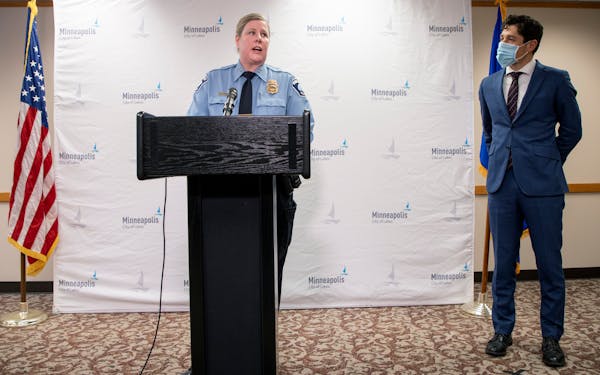On Monday, leaders of a citizen-led public safety committee created by Minneapolis Mayor Jacob Frey called on elected officials to bring the Police Department into a new era by overhauling how the city recruits, trains and holds officers accountable.
The Community Safety Work Group urged city leaders to hire an Indianapolis-based law enforcement company to help rewrite the training curriculum. The system of disciplining officers who break the rules is also "woefully inadequate" and in need of large-scale change, said Nekima Levy Armstrong, a civil rights attorney and activist who is co-chair of the working group.
The proposed reforms include creating a new community safety liaison to help oversee police, expanding the city's mental health and response programs and giving more money to violence interrupters and outreach workers helping to fight rising gun crime.
Frey announced the creation of the work group in December as city leaders looked to chart a path forward for the beleaguered Police Department while curbing crime in one of the most violent periods in decades. The 22-member group includes activists, clergy, business leaders and a former police officer. Levy Armstrong has long been a vocal critic of police and some elected officials in Minneapolis — especially Frey, whom she ran against in 2017 — but at the news conference they stood together to present the findings of the group.
Frey said some of these recommendations are already being implemented, and he plans to include others in his 2023 budget proposal, which will come out later this summer.
"There's no one simple quick fix for public safety," said Frey. "There's no one simple fix for accountability. What we do know is that they are not mutually exclusive."
The list of proposals comes two months after the Minnesota Department of Human Rights charged the city with a pattern of racially bias policing in violation of the law. The two-year investigation found in the past city leaders had made changes to policy — such as a ban on warrior-style training — but they were not effectively implemented.
Frey said the working group has offered recommendations to make sure reforms are "not limited to paper," such as creating the police liaison position to help oversee the changes.
The report cites a significant challenge in recruiting new officers. Since the killing of George Floyd and unrest that followed, hundreds of police personnel in Minneapolis have resigned or taken a leave of absence, and the current pace of recruiting is moving too slowly, according to the report.
The group recommends spending $180,000 next year for administrative support and $175,000 to $200,000 on marketing to attract high-quality candidates.
Recommendations for improving police accountability include more resources for the Office of Police Conduct Review, an alternative avenue for complaints from internal affairs, and revamping or replacing the Police Conduct Oversight Commission, a citizen watchdog board whose members have mostly left out of protest of a dysfunctional and ineffective process.
To increase transparency, the city should re-evaluate its reliance on a practice called "coaching," the work group said. Coaching is a form of one-on-one mentoring that the city says doesn't qualify as real discipline, and therefore it classifies these records of misconduct as private data. In recent years, coaching has been by far the most common outcome for substantiated police misconduct
"Coaching is too often being used as a catch-all for behavior that actually should result in more tangible conduct for officers who violate the law and who violate people's rights," said Levy Armstrong.
Reducing violent crime
The report says local leaders should collaborate better to improve public safety through regular meetings, while the Minneapolis Police Department needs a better data-sharing system with other city divisions dealing with crime prevention.
At the news conference, Lisa Clemons, founder and director of nonprofit A Mother's Love, criticized the working group's primary focus on police reform.
"I went through this whole thing," said Clemons, a former police officer, holding the report. "It did not tell me anything that's going to be done about this violence that we're suffering through in this community right now."
Frey said the government restructure proposed in the report — which he has already recommended — will include a neighborhood safety office. He said many of the recommendations, such as better recruitment, will help curb violent crime as well.
2 dead in Lino Lakes, no known threat to public, police say
Teen charged with murder in deadly St. Paul shooting last month

Clash brewing over Lino Lakes development plan that includes mosque
Minneapolis City Council declines to endorse Frey's Third Precinct plan

